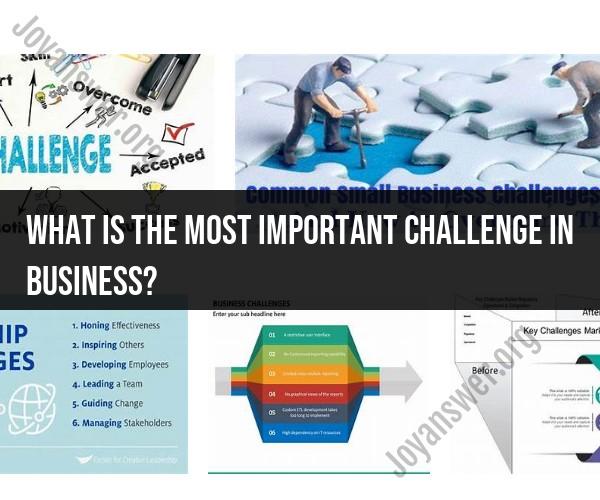What is the most important challenge in business?
Business challenges can vary widely depending on the industry, size of the company, and economic conditions. However, several challenges are commonly faced by businesses across different sectors. Here are some of the most vital business challenges:
1. Economic Uncertainty: Economic fluctuations, recessions, and global events (e.g., pandemics) can significantly impact businesses. Uncertainty in economic conditions affects consumer spending, investment decisions, and supply chain stability.
2. Competition: Staying competitive in a crowded marketplace is a constant challenge. Businesses need to differentiate themselves, innovate, and adapt to changing consumer preferences to maintain or gain market share.
3. Digital Transformation: The rapid pace of technological change requires businesses to continually invest in digital transformation. Adapting to e-commerce, automation, data analytics, and cybersecurity is crucial for competitiveness.
4. Talent Acquisition and Retention: Finding and retaining skilled employees is a perennial challenge. Attracting top talent, offering competitive compensation, and fostering a positive work culture are vital for business success.
5. Regulatory Compliance: Businesses must navigate complex and ever-changing regulatory landscapes. Compliance with industry-specific regulations, data protection laws, and environmental standards can be resource-intensive.
6. Supply Chain Disruptions: Disruptions in the supply chain due to natural disasters, geopolitical issues, or disruptions like the COVID-19 pandemic can disrupt operations and increase costs.
7. Financial Management: Managing cash flow, securing financing, and optimizing capital allocation are critical financial challenges. Many businesses face challenges related to access to capital and cost control.
8. Customer Expectations: Meeting and exceeding customer expectations for quality, convenience, and personalized experiences is essential. Businesses that fail to do so risk losing customers to competitors.
9. Innovation: Staying innovative is crucial for long-term success. Companies need to invest in research and development, product/service innovation, and keeping up with industry trends.
10. Sustainability: Environmental and social responsibility is increasingly important to customers and stakeholders. Businesses must consider their impact on the environment and society and adopt sustainable practices.
11. Risk Management: Identifying and mitigating risks, including cybersecurity threats, legal disputes, and market volatility, is a vital aspect of business operations.
12. Globalization: Expanding into international markets presents opportunities and challenges related to cultural differences, legal requirements, and supply chain complexities.
13. Marketing and Branding: Effectively reaching target audiences and building a strong brand presence in a noisy digital landscape is a significant challenge. Businesses must adapt to changing marketing trends.
14. Disruptive Technologies: Emerging technologies like artificial intelligence, blockchain, and the Internet of Things can disrupt industries. Businesses must evaluate the potential impact on their operations and adapt accordingly.
15. Crisis Management: Preparing for and managing crises, such as natural disasters, cybersecurity breaches, or reputational crises, is essential to protect a company's viability.
Every business faces a unique combination of challenges based on its industry, size, and specific circumstances. Successful businesses proactively address these challenges, often through strategic planning, innovation, and a commitment to adaptability and resilience.












